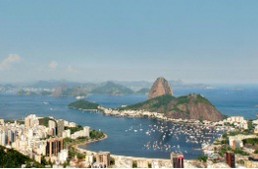Brazil at Rio+20

Since Rio-92, sustainable development has been at the core of Brazilian foreign policy. The country's petition to host Rio +20 fits in with this priority, creating the opportunity for all UN members to meet once again in Rio de Janeiro, to discuss the direction of sustainable development for the upcoming twenty years.
As Conference Chair, Brazil will be responsible for coordinating the work and discussions, to build consensus and adopt concrete decisions aimed at sustainable development. As a United Nations member country, Brazil has presented its national contribution to the base document - which initiates the negotiation process for Rio +20 documents - to the Conference Secretariat.
Holding the UN Conference on Sustainable Development in Rio de Janeiro has special meaning. As host of the Earth Summit, which consolidated the concept of sustainable development in 1992, Rio de Janeiro is the ideal place to hold Rio +20, which points the way forward, in terms of development. The legacy of Rio-92 - especially the Rio Declaration, Agenda 21, the Framework Convention on Climate Change and the Convention on Biological Diversity - will be linked forever to the memory of the intense participation of civil society in the UN debate, generating what is called the "spirit of Rio."
Domestically, the Brazilian Commission for the United Nations Conference on Sustainable Development, created by Decree 7495 of June 7, 2011, has the mandate to coordinate Brazil's participation in the Conference. It is co-chaired by Minister of Foreign Affairs Antonio de Aguiar Patriota, and Minister of Environment Izabella Teixeira. The Commission is also made up of 28 additional ministries and agencies of the Federal Administration associated with sustainable development topics, as well as representatives of the Rio de Janeiro State Government and the Rio de Janeiro City Hall, National Congress and the Judiciary branch. The Brazilian Commission also has an Executive Secretariat, chaired by the Ministry of Foreign Affairs and with representation by the Ministry of Finance, the Ministry of Social Development and Hunger Alleviation, and the Ministry of Environment - these are responsible, respectively, by the economic, social and environmental pillars within the Executive Secretariat.
Civil society is an integral part of the Brazilian Commission, with about forty members representing various social sectors, selected through a transparent and inclusive process. Also part of the Commission are representatives of state and local environmental agencies, the academic community, indigenous peoples, traditional peoples and communities, business sectors, workers, youth, NGOs and social movements. The process of choosing the Brazilian Commission members was set forth by Interministerial Ordinance. 217, of June 17, 2011.
To address the logistical organization of the Conference, Decree 7495 also created the "Brazilian Organizing Committee" (BOC), responsible for the planning and execution of all measures necessary for the Rio +20 Conference, including managing resources and contracts for the official events held within the context of the United Nations. It is also in the BOC's mandate to perform activities related to the management of materials, construction, transportation, assets, human resources, budget and finances, communication, protocol, security and conservation of buildings and furniture used in the organization and hosting of Rio +20.






